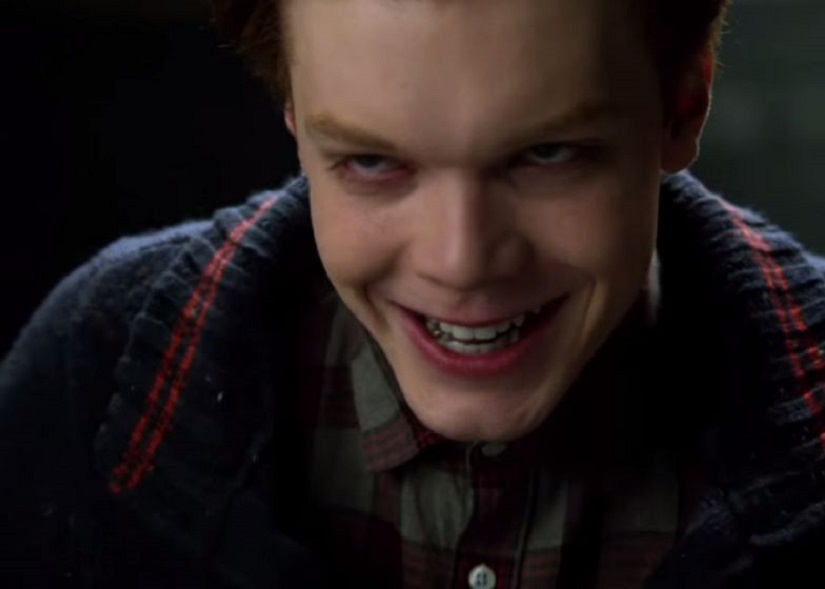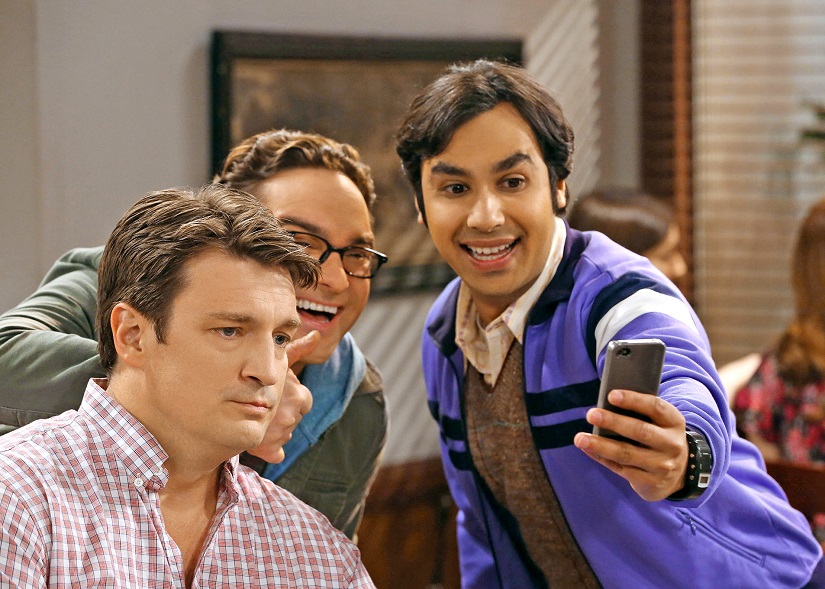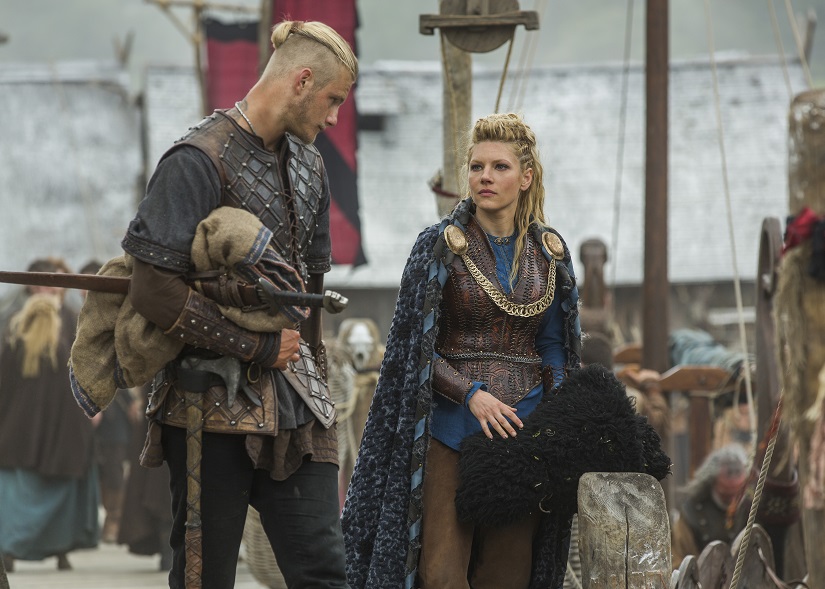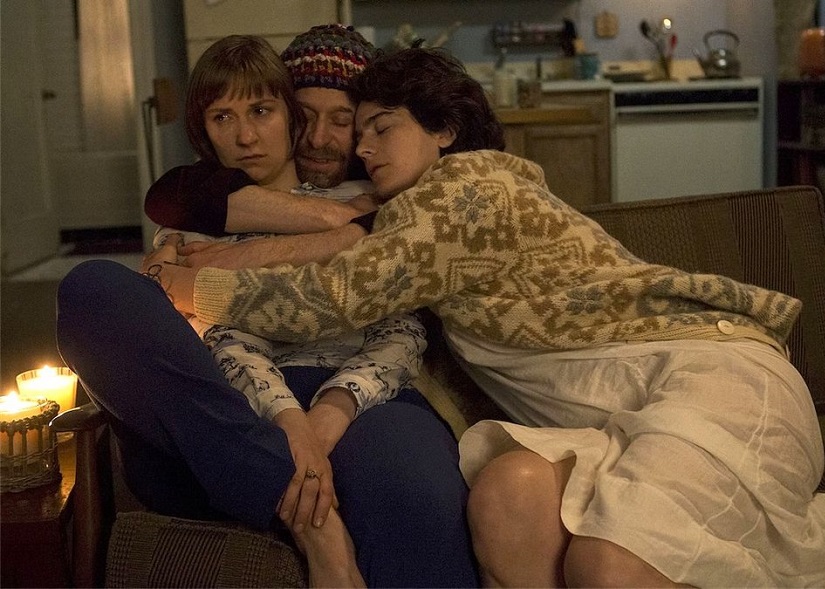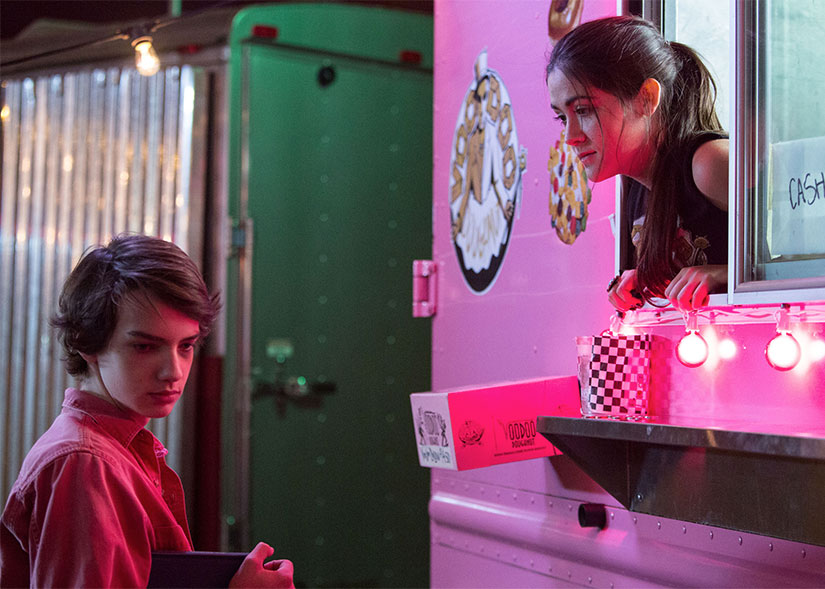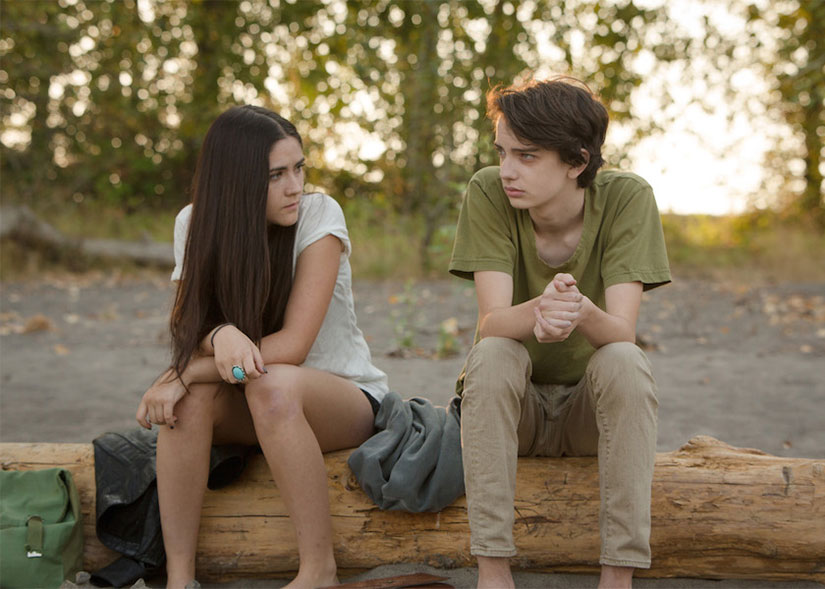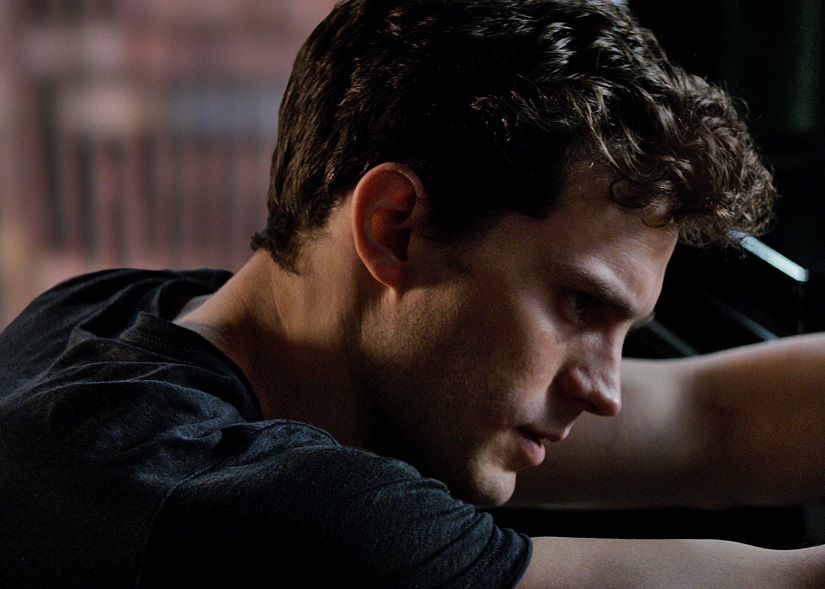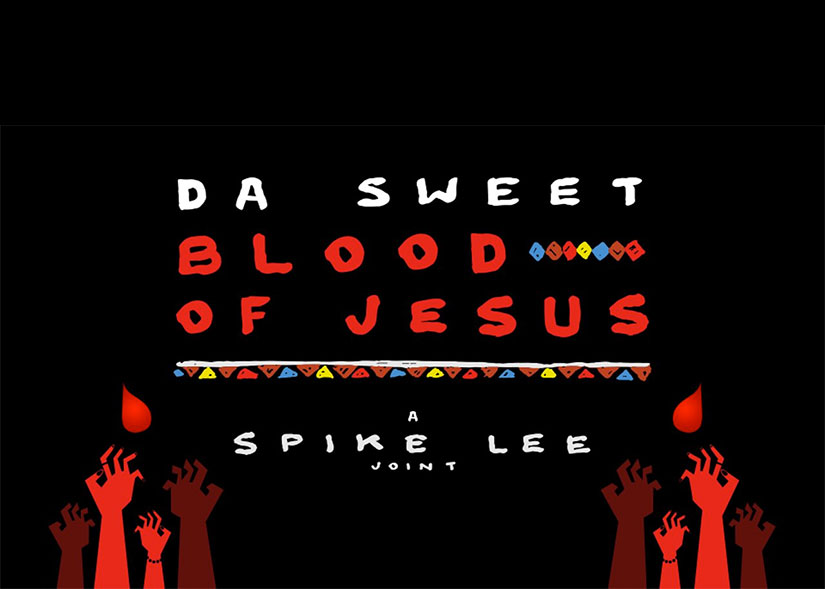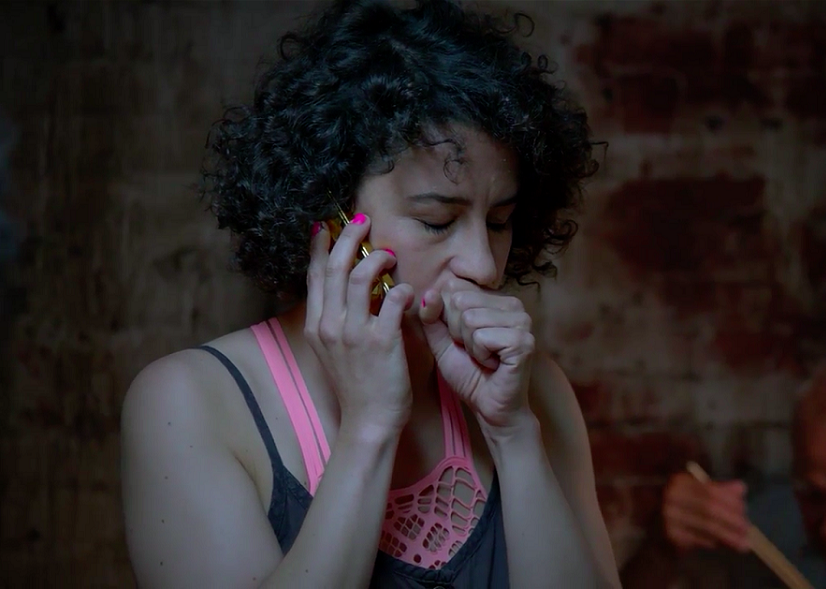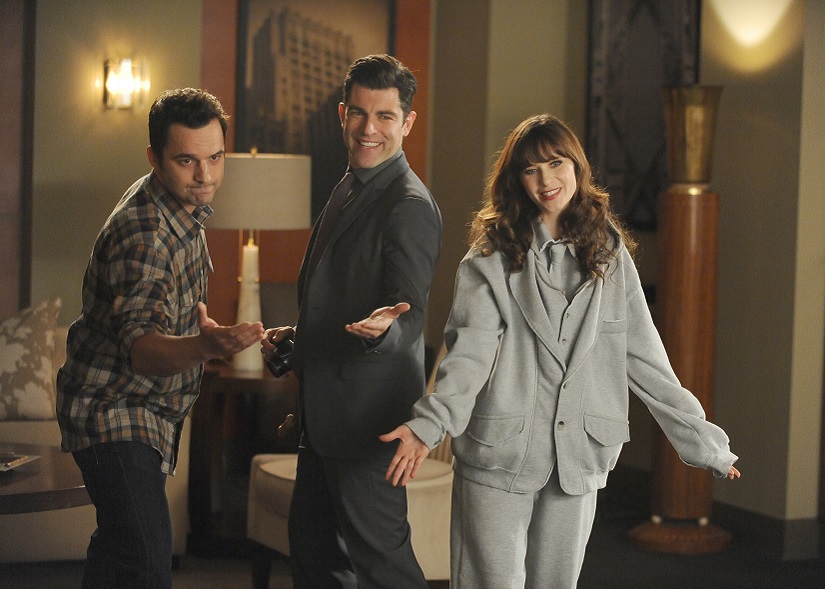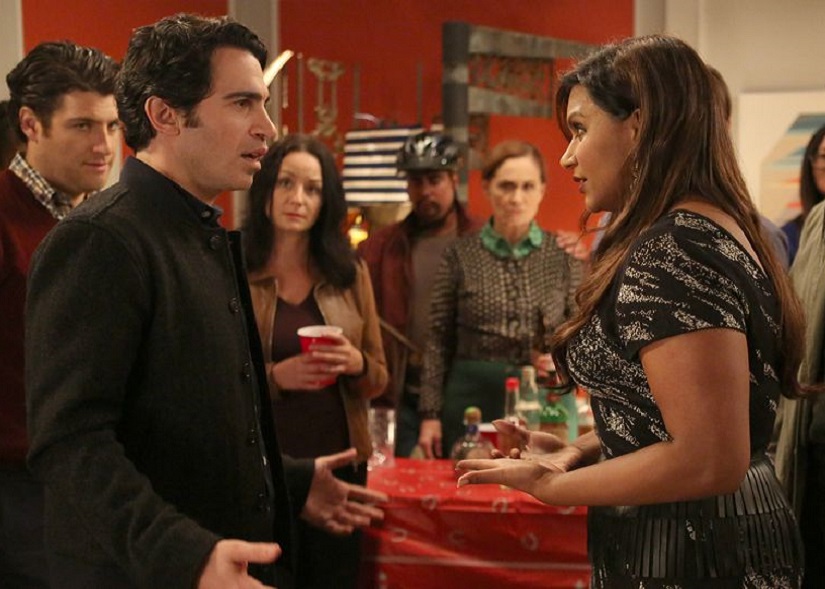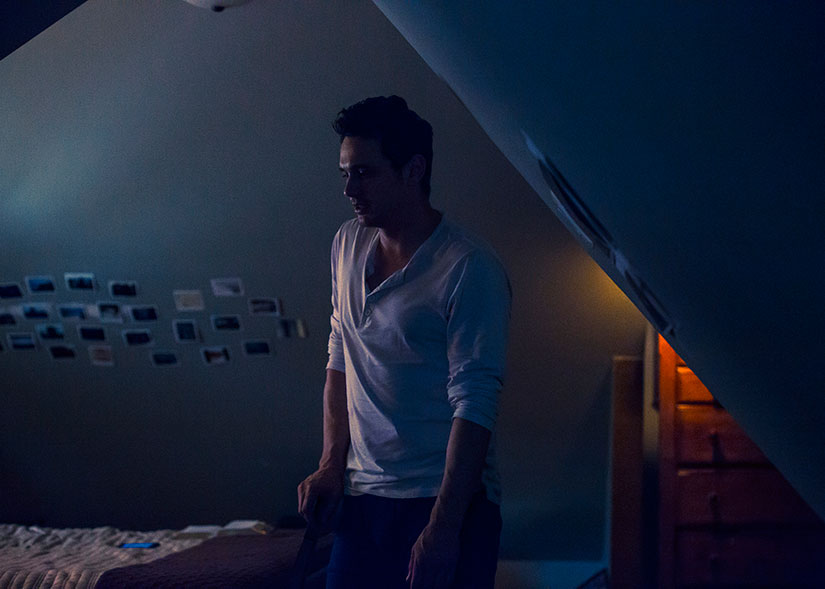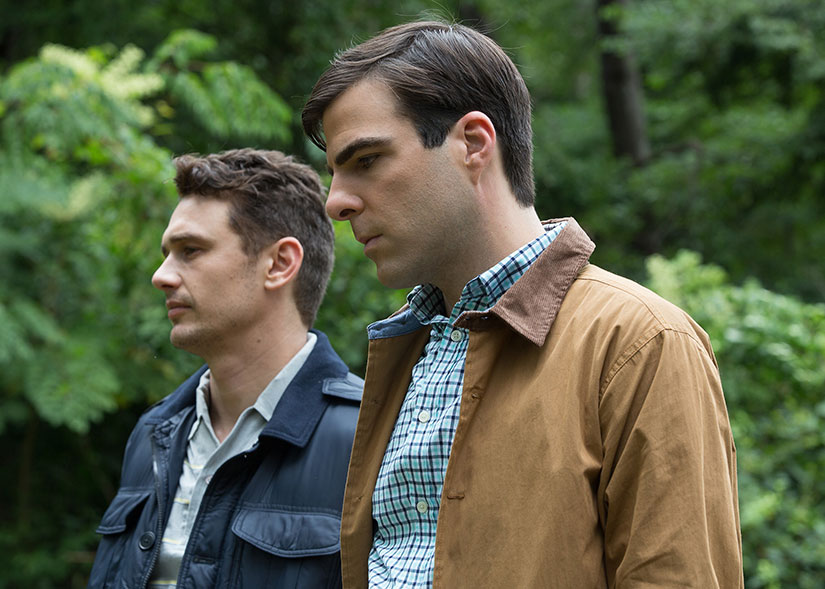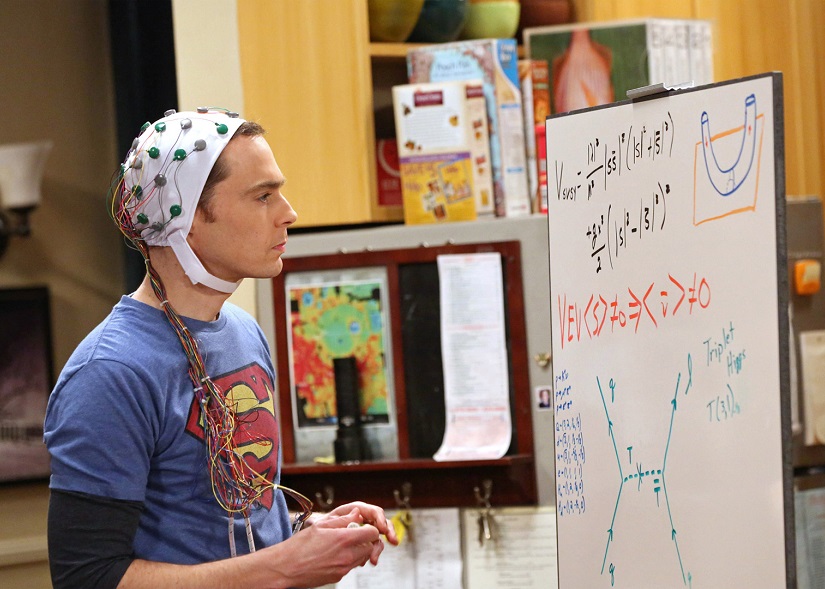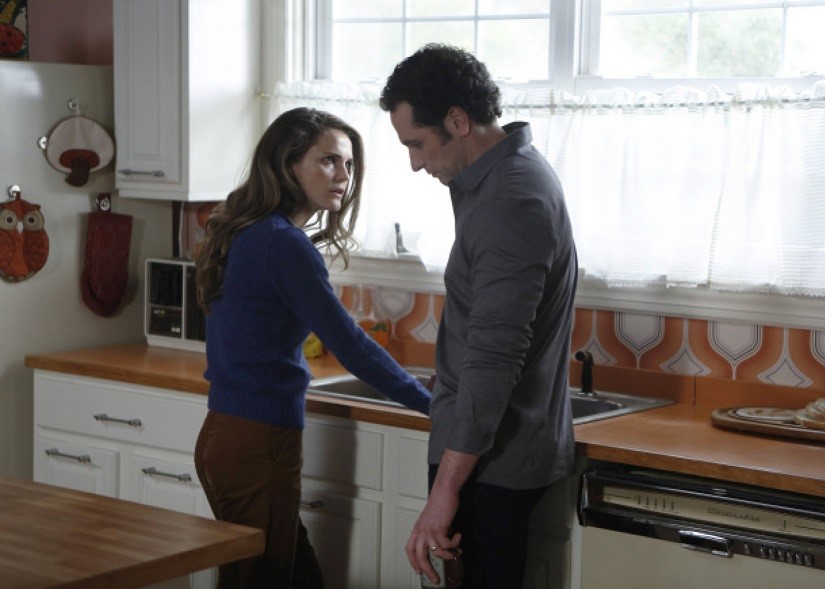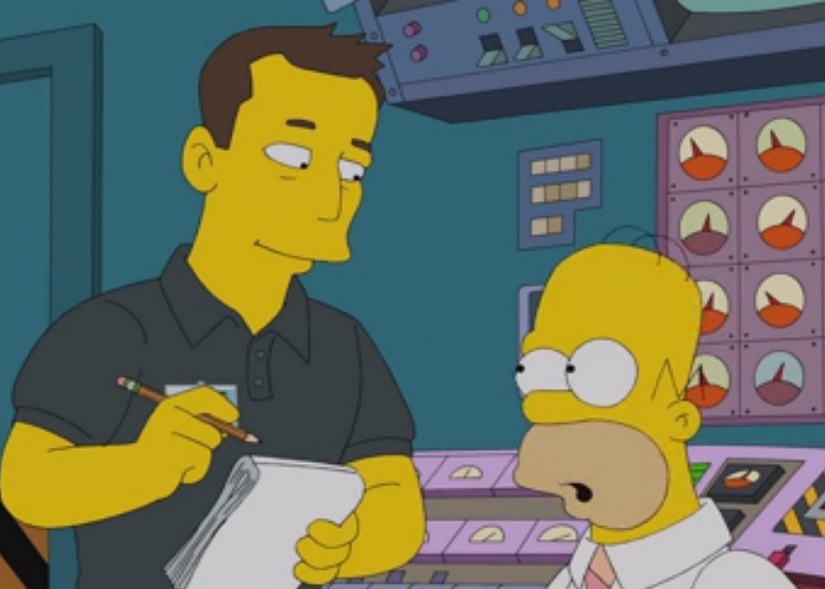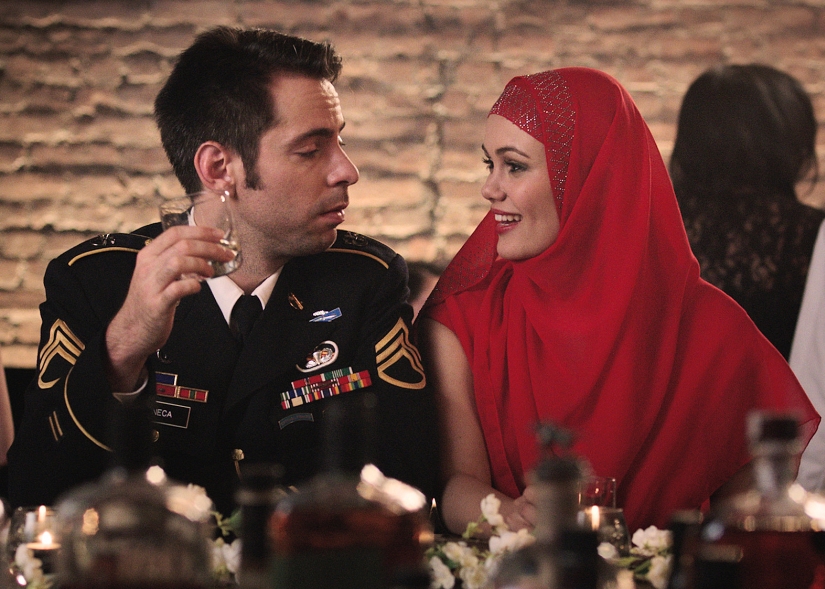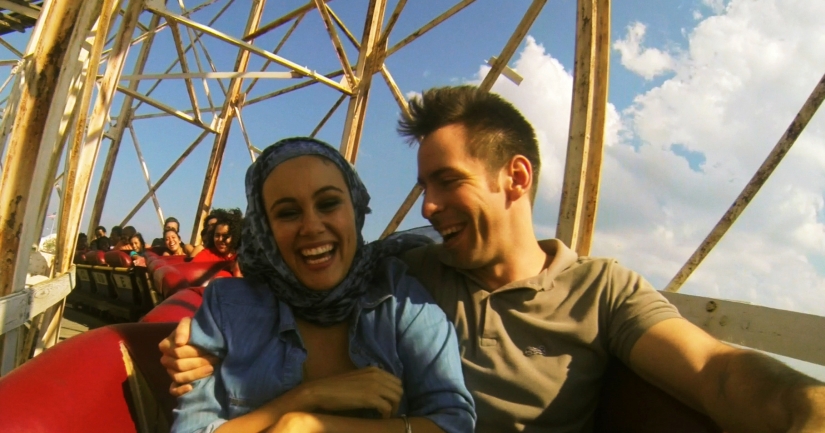[This Week In TV] Gotham, Big Bang Theory, Vikings, Girls
This Week in TV is a weekly feature reviewing the best, worst and most interesting episodes of television from the past seven days. The plan is to cover a wide variety of shows, but not always the same ones each week, so let us know in the comments which ones you’d particularly like to read about. This week sees the Clown Prince Of Crime (possibly) make his entrance in Gotham, a death in the family in The Big Bang Theory, Vikings set sail for England and Hannah returning home to find her life in ruins once again in Girls.
Gotham - 'The Blind Fortune Teller'. Gotham feels on the verge of going full circle into becoming a parody of itself. Afflicted from the beginning with a case of severe tonal discord, the show seems to have doubled down on the lunacy with every passing week while intermittently still trying to engage viewers with what it tries to pass off as serious drama. The cases of the week are often grizzly affairs, yet interspersed with moments of baffling ridiculousness such as Gordon deciding the best way to locate a missing person is to... release and follow their pet snake? True, plots set in circuses have always dabbled in the outlandish even in more serious-minded shows, but Gotham has so comprehensively failed to establish the kind of show it wants to be, bouncing between ploddingly uninventive procedural and overwrought and underdeveloped comic book series, that such inexplicable flourishes just feel like the latest of far too many dunderheaded narrative choices.
The characters, too, seem to be getting more exaggerated. Oswald Cobblepot may have started out as a mummy's boy, but was also a devious criminal mastermind. Now he's so in thrall to her that he'll willfully indulge her delusions even if it means undermining his hard-won standing in the underworld. Fish Mooney, never knowingly understated, is now delivering speeches while standing on top of a kneeling man. Catwoman and Ivy are reduced to temporary stylists for Barbara, who must surely rank as one of the most pointless characters in television history. As for the love-in between Gordon and Dr. Thompson, their reactions to everything are so loopily broad and out of nowhere (Dr. Thompson is suddenly really, really excited about solving a cryptic clue from a psychic, because why not?) that you have to wonder if the cast have finally realised what a complete mess their show is and decided to ham up every clunky exchange just to see what they can get away with.
It's appropriate, then, that this is the point the show chooses to introduce its Joker, or at least heavily hint that way without outright declaring it, a child called Jerome who is just as schizophrenic as the show he's been plonked into. To his credit, the young actor portraying him, Cameron Monaghan, is fantastic, overacting in just the right way - as opposed to the show's insufferable takes on Edward Nigma and Harvey Dent, for instance - and snapping between Nicholson and Ledger with palpably unhinged ferocity. I don't particularly like the idea of the character being given one conclusive origin story (especially one so mundane, with yet more mother issues) but Monaghan plays his cards with stupendous relish, immediately becoming the most interesting player in the show's overblown roster. Hopefully there'll be more of him to come, because god knows it's becoming increasingly difficult to pick out anything else to look forward to in a show gradually sinking under its own weight.
The Big Bang Theory - "The Comic Book Store Regeneration". When it's on form, I'm actually a fan of Big Bang. Its characters have been intelligently developed over the years and the writers have steadily pushed out the uglier elements from the show's early days. True, it still has the bad habit of laughing at its characters rather than with them, but there's a lot more sincere affection for them than there used to be and the addition of Amy and Bernadette introduced a more balanced female perspective that offered new sources of comedy whilst forcing Penny to develop into a more distinct character than 'hot blonde across the hall'. Prior to that, the only alternate female voice - literally - was Howard's mother, a shrill and insufferable Jewish stereotype whose off-screen presence was used almost exclusively to make uncomfortable jokes about her weight and hygiene. Despite the faultless commitment of actress Carol Ann Susi, the character was never allowed to develop beyond those problematic roots.
What a shame that was, because it is difficult not to reflect on how much more Susi deserved out of her swansong role following a long and successful career in television and on stage. Her passing in November of last year meant Big Bang was to finally lose the difficult Mrs Wolowitz under the worst possible circumstances and without the chance to grow the character into someone more deserving of the talent behind her voice. In-keeping with a season which has struggled to reach anything approaching the highs of last year, 'The Comic Book Store Regeneration' was for the most part a bewilderingly flat half-hour that held back its major development - Mrs Wolowitz' death - until the final minutes, even though the material leading up to it felt like the most tedious kind of padding (Nathan Fillion's utterly pointless cameo) and retreading barren ground (Howard's feud with Stewart). While the announcement of the death was delivered in a strangely graceless manner - Howard wandering around aimlessly for a moment before declaring "My mom died" out of nowhere - the final scene at least provided a sincere tribute to the character and Suzi by proxy, with Sheldon's sweet consolation to his grieving friend an effective nod to how the character has grown. Hopefully next week's episode, 'The Intimacy Acceleration', will continue to explore Mrs Wolowitz and Carol Ann Suzi's legacy on the show, because while sweet enough in its limited way, leaving the tribute until the final five minutes felt utterly inadequate as recognition for one of the show's most enduring performers, for better (the actress) or worse (the character).
Vikings - "Mercenary". I haven't seen a lot of Vikings, but the show has slowly grown into a bonefide ratings and critical hit over its two preceding seasons. At the end of last season, protagonist Ragnar became king by outmanoeuvering and killing the deceitful Horik. Ragnar, a former farmer, is at once a natural leader and an outsider within his own people: a man of foresight and peace, whose first interest is finding somewhere to settle down and make a home even while enjoying his obvious talent for leadership and combat. It's not especially unusual for a historical drama to show a character caught between his civilised intellect and more primal urges encouraged by the society around him, but Vikings has done a terrific job establishing a world echoing its hero's conflict: on the verge of civilisation, yet not quite ready to abandon the rule of the sword.
That dichotomy was at the core of the drama in 'Mercenary', Vikings' third season premiere. Having negotiated a settlement with King Ecbert Wessex (read: England) that would seemingly guarantee peaceful co-existence between their two peoples, Ragnar discovers Ecbert wishes to add an addendum to their deal, using the Vikings' combat prowess to defeat his rivals and secure his dominion of the kingdom. Ragnar and his men reluctantly agree, leading to a climactic battle in which they storm one of the two armies which have flanked their longboats on either side of a bay. It's a well-staged sequence, if a little lacking in momentum due to the ease with which the Vikings repel the onslaught of arrows sent their way before ploughing fearlessly into the opposing army, which offers little serious resistance. It helps that the scene comes at the end of an episode a little too dialogue-heavy for its own good, laying out the key dramatic notes for the season ahead (as all premieres must) but falling back too often on telling rather than showing. Still, it's solid enough stuff and Floki's total inability to handle how kind and loving his wife is was a fantastically funny break from the seriousness elsewhere. It may have felt a little leaden-footed on its own, but the groundwork laid in Mercenary was promising enough to offer encouraging signs for the state of the season ahead.
Girls - "Sit In". Hannah Horvath's continual dipping in and out of existential despair is a well Girls has gone to time and time again, yet one that never seems to run dry of fantastic material. Happy Hannah is mostly fun when we can see her setting up her own inevitable downfall, but Lena Dunham seems to take perverse delight in making every one of those falls back down to earth even more shameful and rooted in blind self-absorbtion than the last. When Marnie - Marnie! - is able to see the situation clearly enough to offer sensible advice, it's probably best to admit you've probably made a huge mistake. Having abandoned her writing course in Iowa after alienating every single one of her (admittedly unpleasant) fellow students, Hannah returns home to find boyfriend Adam shacked up in her flat with new girlfriend Mimi-Rose Howard, or as she is delightfully described, "a girl's name and a boy's name with a flower stuck in the middle". Her old friends don't seem all that delighted to see her either, having felt that she'd abandoned them just as they were on the cusp of rekindling their lives and friendship. As if it couldn't get any worse, Mimi-Rose seems to be exactly the kind of honestly reflective, if undeniably pretentious, creative spirit Hannah wishes she could be.
'Sit In' takes place entirely within Hannah's flat, with almost the entire main cast of characters turning up in sequence. Jessa and Shosh go first, with Jessa taking no time at all to insult Adam for making Marnie his first choice call and reminding everyone why a well-delivered 'twat' can be one of the funniest single words in the English language (see also: Red Dwarf). It's a lovely example of everything Girls does so well at its best, at once mercilessly humiliating Hannah for laughs - oh, that bucket - while offering just enough sympathy for the insecurities and doubts of this most unintentionally self-destructive of characters to not feel vindictive. The other characters were there to either remind Hannah of how she'd let them down or offer amusingly overbearing amounts of sympathy for the breakdown of her relationship with Adam (you'd think the series had relocated to England given the amount of tea on offer, itself subject to a great piece of Horvath incredulity), with inspired one-liners coming thick and fast ("This isn't one of your more convincing fake showers!") and some fabulous visual gags, such as the uncomfortably extended hug-turned-weirdly-sexual-something in the screencap above. Still, if all else fails, at least Hannah can take comfort from knowing she's now got Marnie as a soulmate. Right...?
[Review] All the Wilderness
Indie films in which teenagers have to cope with the death of a close family member or loved one tend to be dark, moody films contrasting the loved one's death with the protagonist's "birth" (or "rebirth"). They're somewhat formulaic and predictable, with adventurous films utilizing the concept into a genre film. Nevertheless, it's hard to argue against how influential the impact of a death has on a teenager at a time when nearly everything in the world will have some bearing on creating who said teenager will become. While All the Wilderness does utilize the concept, the film separates itself from the pack with an entrancing soundtrack, perfect casting in Kodi Smit-McPhee, and cinematography that lends itself well to both Portland's urban and rural landscape.
[youtube id="FjuDhvPiaVg"]
All the Wilderness
Director: Michael Johnson
Rating: N/A
Release Date: February 20, 2015
Still reeling from his Dad's suicide, James (Smit-McPhee) has found himself fascinated with nature and death, occupying his time sketching illustrations of dead insects and animals into a notebook and telling another kid that he knows when he'll die. Worried about her son's development in the wake of the death, James' Mom (Virginia Madsen) makes him visit a shrink (Danny DeVito) weekly, and it's at his office that James meets Val (Isabelle Fuhrman), an alluring girl whom he is immediately drawn to. During one adventurous night in which James explores the "wilderness," he meets Harmon (Evan Ross), a street punk that immediately brings James into his circle. It's through Harmon and Val that James begins to find a new sense of self and identity
Smit-McPhee shines in All the Wilderness, living up to the accolades the actor has garnered in his already storied, but young career. In the wrong hands, James would have been a whiny brat; in Smit-McPhee's hands, rather, he's a multi-layered character inquisitive of his place in the world. The characterization is also thanks to the sound writing and direction from the debuting Michael Johnson. Alongside cinematographer Adam Newport-Berra, Johnson's story and vision examines all sense of the word "wilderness" by comparing and contrasting the vast woods near James' home to the squatter warehouse where Harmon lives and the wild, rebellious night life James is introduced to with the reserved, introverted life James spent prior to meeting Harmon. Accolades must also be shared for the film's soundtrack, which features Sonic Youth, Elliot Smith, and songs from Jonsi and Alex of Sigur Ros; if there were ever a soundtrack that was capable of capturing teenage melodrama that can also capture the atmosphere of a wild forest or city setting, this would be it.
All the Wilderness will appeal to indie film darlings that can't get enough of coming-of-age films (like myself). As mentioned earlier, Smit-McPhee continues to show growth and talent at a young age, and it's only a matter of time before he finds stardom (outside of his recent casting as Nightcrawler in the upcoming X-Men: Apocalypse). Writer/director Michael Johnson also shows promise with a strong debut.
[Review] Fifty Shades of Grey
I knew very little about Fifty Shades Of Grey going into the movie, other than it being about BDSM and that the book's prose was the subject of widespread derision. The latter point always seemed an odd one to me: reading erotica for the prose sounds a bit like watching porn for the art direction. It exemplifies an attitude of snobbishness which continues to permeate criticism of the arts in all media. By most accounts, plenty of women found the book an entirely pleasurable experience. It must have been doing something right.
As you've probably worked out by now, that kind of introduction is only heading in one direction, so I'll just out and say it: look past the upturned noses and Fifty Shades Of Grey is not only a perfectly decent movie, but wittier and more subversive than many would have anticipated.
[youtube id="SfZWFDs0LxA"]
Fifty Shades Of Grey
Director: Sam Taylor-Johnson
Rating: R
Release Date: February 14, 2015
Were you expecting a bodice-ripping, dick-swinging, ass-pounding, ball-squeezing, face-sitting, vaginal-fisting extravangza, Fifty Shades is not it. The fact the movie made it to cinemas should have told you that much, and besides, in the event of disappointment, there's always YouPorn. Though there's a cursory amount of whipping, some tied hands and quite a bit of moaning, director Sam Taylor-Johnson consciously shifts away from anything resembling exploitation. It is best described as a sex-themed character drama, more concerned with subverting screen representations of male and female sexuality, when they exist at all, than utilising them for blunt titillation. There's a reasonable amount of sex, but artfully shot and with one eye clearly aimed at meeting the requirements of the R rating. Only Anastasia shows anything provocative, though given how close a few of cuts are to Christian's crotch, the feeling pervades that this is more the result of institutional sexism at the certification boards rather than willing self-censorship.
Even so, the flashes of pubic hair from both lead characters feels satisfyingly liberated compared to the sterility afflicting your average blockbuster. The imbalance in what the movie is allowed to show does have the side-effect of slightly shifting the movie's gaze towards Anastasia rather than Christian, where it should be, but this is nevertheless the rare movie which emphasizes female pleasure first and foremost. True, it's mostly through bitten lips and sensual gasps, but remains a heck of a lot better than anything else Hollywood has provided in recent decades. Fears about Anastasia's position as the submissive in the relationship are also ill-founded: consent is not only a key concern for Christian, but to such an extent that it almost circles around to satirising the challenges of tackling that topic in real-life. Ana's distaste for the consent contract which Christian is desperate for her to sign can't help but nudge, if accidentally, towards the inherent hypocrises of 'yes means yes' laws.
The fact Fifty Shades is the rare Hollywood movie where the entire creative team is female makes its even-handed treatment of gender and sexual expectations all the more poignant. This is a movie where a woman inhibited by her sexual shame meets a man imprisoned by his and through pushing the limits of their sexual and emotional horizons, begin unearthing each other's buried humanity. Dakota Johnson is a revelation as the meek but quietly intelligent Ana, bringing considerable pathos and underlying strength to the role as the character gradually learns to assert herself in bringing her relationship with Christian onto her terms even while acting as his submissive. The movie may offer the tamest possible representation of BDSM, but understands the seemingly contradictory principles at its core (pleasure through pain, liberation through abandonment of control) and neatly weaves them into its character arcs. It may not be particularly subtle, but it works.
As Christian, Jamie Dornan struggles to make much of an impact beyond, to judge by the panting admiration of the girls sitting behind me, the not inconsiderable appeal of his toned body. Christian is tormented by his obsession with control and how Ana challenges his refusal to engage with women on anything other than the terms of a contractually defined relationship. Dornan is a little too baby-faced and young to authentically sell the character's depth of sadness and anger, leading to his brooding seeming a little too practiced and pouting to make his inner turmoil completely believable. Were the movie more geared towards the mostly implied eroticism, his aesthetic appeal would be more than enough. With emphasis instead placed on the character drama, his struggles make Christian more frustrating than enigmatic and restrain - and not in the fun way - his chemistry with Dakota Johnson.
Also frustrating is the movie's status as the first entry in a planned trilogy. After a lively opening, the pace drags considerably during the middle act with a few too many repeated 'why don't you let me in' conversations and family drama which emphasizes Ana's homespun nature but gets mighty tedious while doing so. The cliffhanger that concludes the movie, while an important moment for Ana, feels like it should have arrived at roughly the halfway or three-quarter point rather than being spun out into an entirely unsatisfactory ending (reaction of the girls behind me: "What? Is that it?"). It's even more of a shame because the movie cuts off just as both characters seem on the verge of a breakthrough without having quite crossed the threshold. A dinner-slash-business meeting between Ana and Christian, wonderfully lit in lurid orange, marks the beginning of the final act and is a noteworthy highlight for finding the perfect balance between tension, humour and engaging character work.
That the movie never quite finds that level of cohension again is a shame, because its individual elements are played with unexpected consideration and, occasionally, tenderness. It's easy to see why the story has connected so strongly with such a large audience, bringing together as it does the essential clichés of arguably the two most widely beloved female-appealing stories - Cinderella's prince and the ingenue dynamic, plus Pride & Prejudice's reserved, Byronic love interest - and twisting them into something at once dark but modern, open-minded and gently empowering. Sure, you can criticise the unmemorable dialogue (sadly, only one 'holy cow!' and not a single 'oh jeez!'), the repetition of several narrative beats, cheesy use of soundtrack and a meandering middle act, but submit yourself without inhibitions and you may be surprised how much you enjoy the experience.
[Review] Da Sweet Blood of Jesus
Following a troubled production for 2013's Oldboy that saw Lee's cut of the film cut and edited to remove 35 minutes, resulting in the film being deemed a "Spike Lee Film" rather than his patented "Spike Lee Joint," the famed director turned to Kickstarter to find funding for his next film, Da Sweet Blood of Jesus. Free from the typical studio workings, the film could have been exactly what Lee needed to express himself with full creative freedom. Instead, Da Sweet Blood of Jesus is a mediocre film that shows Lee may not be able to re-capture the energy and excitement that jumpstarted his career.
[youtube id="n739-zHeooQ"]
Da Sweet Blood of Jesus
Director: Spike Lee
Rating: N/A
Release Date: February 13, 2015
Dr. Hess Green (Stephen Tyrone Williams) is a wealthy anthropologist researching the Ashanti Empire that comes across a fabled Ashanti dagger. During one strange night, Hess's assistant, Lafayette Hightower (Elvis Nolasco), stabs Green multiple times in the chest. Guilt-ridden by the apparent murder, he commits suicide; however, Green awakens hours later, sensing something changing within him. As the days progress, Hess finds himself drawn to blood, convincing women to have sex with them, just to murder them right as intercourse is about to begin, drinking up their blood. When Hightower's widow, Ganja Hightower (Zaraah Abrahams) arrives at Martha's Vineyard to relocate her husband, both she and Hess are inexplicably drawn to one another, leading to her eventual discovery of Hess's secret.
Da Sweet Blood of Jesus is a reinterpretation/reimagining of the 1973 blaxploitation film, Ganja & Hess, which explored themes of addiction through the framework of a vampire film. While exploring the addiction element, Lee's modern reimagining also centers on wealth and privilege. However, whereas the former film was praised for its thematic explorations through the lens of the vampire/horror genre, the latter loses focus and is never really clear about what it's attempting to come across to its audience.
Central to the film is Hess's undeniable wealth, buoyed by his large collection of African art and his residence on Martha's Vineyard. However, beyond the flashes of wealth and status, nothing is ever really said about it. As someone who's willing to analyze sociopolitical issues like wealth and poverty, Da Sweet Blood of Jesus feels like a missed opportunity to provide commentary on the subject, save for a brief party scene. Instead, the film focuses on the "Is he or isn't he?" element of Hess's transformation into a "vampire." Without using the V-word, the film hones in on his newfound addiction to blood and pairs this together with his sexuality. As started earlier, Hess turns his victims by first seducing them, creating a parallel between his literal insatiable thirst for blood with the more figurative taste for sex, creating an extra layer of depth to the film that desperately needs it.
However, save for Abarahams' presence and her humorous interactions with Rami Malek, who plays Hess' live-in servant Seneschal Higginbottom, Da Sweet Blood of Jesus feels shallow, vapid, and lifeless. with no real sense of direction. In the 40 years since Ganja & Hess premiered, an endless number of films have tackled addiction, social issues, and genre alike in fresh and exciting ways. Lee's attempt, however, just feels uninspired and lacking any true motivation. Whatever it is Lee wanted to say with Da Sweet Blood of Jesus is lost somewhere in the mix amongst ill-used modern songs and a soundtrack from Bruce Hornsby that further alienates the film's focus.
A lot of criticism has been cast on established actors and filmmakers who turn to crowdfunding platforms like Kickstarter to fund their films, as they're targeting fans of their work who may not be able to afford the $20 or so donation, but would like to directly contribute to their favorite actors or directors. However, without the pressures of a studio, Da Sweet Blood of Jesus could have been the perfect opportunity for Lee to shake off 2013's disastrous remake of Oldboy and to find his own voice. Instead, the film is more like a student film or Lifetime special that is never able to find itself.
That's not to say Da Sweet Blood of Jesus doesn't try to reach a level that will touch audiences on a deeper level; rather, it just never quite succeeds at it. Lee should be applauded for not only giving homage to a pivotal film, but for also spreading his wings and exploring new opportunities in film. However, I'm sure I speak for everyone when I say I wish he would focus on what he knows and has proven to be successful at.
[This Week In TV] Jane The Virgin, Broad City, New Girl, The Mindy Project
This Week in TV is a new weekly feature reviewing the best, worst and most interesting episodes of television from the past seven days. The plan is to cover a wide variety of shows, but not always the same ones each week, so let us know in the comments which ones you’d particularly like to read about. This week takes a look at the ladies in television, starting with a big reveal on Jane The Virgin, a strap-on standoff in Broad City, Jess trying to save a disastrous business pitch in New Girl and big moves in The Mindy Project.
Jane The Virgin - "Chapter Twelve". Jane The Virgin has been this season's critical darling since its debut last October, another triumph for the CW in its expanding library of strong genre programming. Jane's near perfectly balanced blend of melodrama, comedy and pathos came out of the gate fully formed and making an instant star of lead actress Gina Rodriguez, whose performances have infused the sharp writing with soul and sweetness. Twelve episodes in and there's no signs of slowing down: Rodriguez's Jane remains far and away the most huggable person on television, while each episode somehow manages to pack in moments of sincere, heartfelt sweetness alongside a cavalcade of increasingly loopy plot developments. The news last week that Jane was to become a writer for a telenovela threatened to be a little too cute for its own good, but worked perfectly in the context of this episode: she's delighted to be offered the chance to write an episode of her own, but less so when it is revealed she was only chosen because no-one else was willing to write a death scene for diva-ish star Rogelio, who is also Jane's father.
Jane's struggles to write Rogelio's big death scene at the end of her episode meant a fun little jaunt through the series' main themes. Having her take inspiration from a moving act of forgiveness from her grandmother was a perfect resolution for a show which has always put family and empathy front and centre, but the realisation that making the scene sing meant embracing the spirit of the telenovela was no less important. That spirit is what has given Jane its identity and the acknowledgment felt like the writers giving a nod to the fact they know exactly what their show's strengths are and how to play to them. That decision also informed the big reveal of Sin Rostro's identity, which played out in the most deliciously ludicrous manner as Rose drowned Emilio in cement - a pretty nasty way to go, all things considered, but finding just the right application of camp to stay on the right side of nastiness. The same was true of the fantastic pre-commercial scene of Milos seemingly slitting Petra's throat, a twist so shocking it went full circle into hilariousness, only to be revealed as a ruse to prove Magda was faking her disability.
While I still feel that Jane's hyper-condensed plotting can get a little exhausting over a full hour - two half-hours per week might be a better fit - the show continues to demonstrate such a masterful command of tone and momentum, not to mention a cast impossibly adept at making the comedy and drama work in tandem without cancelling each other out, that it is rarely anything less than a delight.
Broad City - "Knockoffs". Broad City boggles the mind in the best possible way, because even at a time when Archer and Rick & Morty exist, it still manages to go places you could never in a million years imagine a television show - a live-action one, no less - getting away with, especially when committing to its filthiness with such unrestrained delight. A comparison between the doe-eyed Jane The Virgin and a show as bawdy as this may seem a tad misguided on the surface considering the, erm, contrasting nature of the material, but there's a definite similarity in what allows the two shows to get away with what they do: in Jane's world, the craziness of the plotting; in Broad City, being able to dedicate an episode's main plotline to strap-on sex and one man's devotion to his personalised, ethically sourced green dildo.
Both shows, at their heart, are about family and friendship. Ilana and Abbi may be trashier, louder and more clumsily hopeless at everyday existence than Jane's open-hearted clan, but it's their unconditional support and affection for each other which keeps Broad City charming. Take, for instance, the strap-on plotline. A lesser show would likely make fun of Jeremy for his kinks or Abbi for her discomfort, but Broad City actively celebrates that weirdness, a spirit hysterically embodied by Ilana's dance of joy at discovering Abbi's situation. Make no mistake, it's very, very funny stuff, especially the For Your Eyes Only-riffing shot between Abbi's legs of the dildo dangling down over a delighted Jeremy, but there's a sincere sense of love at the idea of two people pushing the boundaries of their sexuality. That positivity is what fuels and humanises the comedy, appreciating the fact people can be into to some pretty unexpected stuff, but that's OK because it's what makes them who they are. The argument which broke Abbi and Jeremy up may have seen Jeremy act like a bit of a dick (I know, I know) over the specifics of his kink, but there's no sense of finger-pointing because it had already been established how important it was to him.
Meanwhile, Ilana and her mother's B-plot was pretty much just a series of ridiculous events - from collecting knock-off handbags in a sewer to being arrested en-route to a funeral - but punctuated with some great gags, from the pair's inherited similarities - vigorously shaking the nail polish in unison - to Bob Balaban's flustered turn as Ilana's dad. It's a terrific sequence that may not have much substance behind it, but worked as a hilarious insight into a day out with a particularly eccentric family.
New Girl - "Swuit". 'Swuit' isn't an especially funny episode of New Girl, but does demonstrate that after a disappointing third season in which overcomplicated plotting and tedious romantic complications weighed heavily on the show's lightness of touch, showrunner Elizabeth Meriweather has managed to get things back on track by returning to the simple comic formula of the first two seasons even if the jokes don't always land as precisely as they should. The show's greatest strength is in bouncing the loft's four utterly ridiculous personalities off each other under increasingly fraught circumstances. Pairing them up resulted in those personalities being shackled by having to work as part of a credible couple, particularly as the cast's comedic straight men have been provided almost exclusively by supporting characters such as the ever-incredulous Cece - huge shout-out here to Hannah Simone for what must be one of the funniest range of aghast expressions on television. It's the fact that the five main characters are so completely useless at working together, but try so hard anyway, that has been at the heart of many of New Girl's funniest episodes.
In that respect, 'Swuit' should've been onto a winner in focusing on Nick and Schmidt's attempts to come up with a business plan together under the pressure of an impending deadline pitch. For all that it's possible to analyse everything down to the most minute detail, the simple truth is that sometimes the jokes just don't quite hit even when they probably read fantastically well on paper. Nick and Schmidt shouting lovely things at Jess was never much more than mildly amusing, despite being an appropriate reaction on a character level for two furious people who nevertheless appreciate their friend's good intentions. The stammering pitch to Lori Greiner started well, but faded once the joke's single dimension wore thin. Winston and Coach investing in Cece's future up until discovering that future would be built on an arts degree was pretty funny - especially the course professor's resigned despair at his lot in life - but never quite found the spark to really take off. Regardless, that 'Swuit' proved one of the weaker episode in recent weeks is testament to how well New Girl has stabilised itself after last season's near-collapse.
The Mindy Project - "No More Mr. Noishe Guy". All cards on the table, I'd never watched The Mindy Project before this week, but with all of this article's shows having a somewhat feminine bias, thought I'd fully commit to the idea by taking a look at a show which seems to have grown in popularity and appreciation over the past few seasons. As a first time viewer, it's easy to pick out the elements which likely inspired that creative revival: Mindy Kaling is a perfectly likeable presence at the centre of the show, with a similar set of core characteristics - professional competence masking a scatterbrained personal life, devotion to food, lack of appreciation from her colleagues - to the late, great Liz Lemon. The overall tenor of the show is more low-key in its zaniness than 30 Rock or Parks & Recreation, but shares an appreciation for offhand silliness, whether delivered via a quick-one liner or a visual gag like a rat-infested brownstone.
The problem is that while low-key is fine, it here led to everything feeling strangely subdued. On the evidence of 'No More Mr. Noishe Guy', the more outlandish quips felt somewhat at odds with a mood that would seem better suited to more dry, subtle humour than Mindy being mistaken for Malala Yousafzai - which, admittedly, is supposedly based something Kaling experienced in real life - or getting all her medical treatments done at once. The quirks of Mindy the character also seem a little too indebted to Liz Lemon, but struggled to integrate as well in a character played relatively straight. The show broadly felt more geared towards its dramatic elements, which included an effectively played thoroughfare about having to adapt to life taking major turns out of the blue, than its comedic ones, which tended to come in fits and starts. Obviously as someone coming in at what is a major turning point of the season, with one character leaving the show and a pregnancy revelation throwing Mindy's life into further disarray, there are undoubtedly plenty of nuances which will have passed me by - hopefully the personalities of the non-Mindy characters feel more distinct with the benefit of long-term viewing, for instance. The show seems perfectly agreeable, but with Broad City, New Girl and Parks & Rec leading the line and 30 Rock still fresh in memory, a distinctly disposable entry in the resurgent field of female-led comedy.
[Sundance Review] I Am Michael
The story of Michael Glatze is a very intriguing one, so if you're unfamiliar with him or the New York Times article I Am Michael is based on ("My Ex-Gay Best Friend" written by Benoit Denizet-Lewis), I highly recommend reading it when you have time to spare. With that said, I Am Michael focuses on Glatze's journey from being one of the most visible, outspoken gay activists of the late '90s to becoming one of its most vocal dissenters as he renounced his homosexuality to become a Christian pastor later in life. As is the nature of biopics, a lot of details are glossed over for sake of pacing, time structure, etc., but overall, I Am Michael serves as a quick primer into the intriguing life of a once prominent "ex-gay."
I Am Michael
Director: Justin Kelly
Rating: N/A
Release Date: January 29, 2015 (Sundance)
Michael Glatze (James Franco) was a vital voice in the LGBT community, with his roles as a managing editor for XY Magazine and co-founder of Young Gay America magazine helping many other young gay youth find a strong voice to help with their own personal journeys. During this time, he was in a committed relationship with long-time boyfriend and former co-worker, Bennett (Zachary Quinto). Always intrigued with queer theory and identity, Glatze was always debating what exactly defined homosexuality outside of the base simplicity of same-sex attraction. However, following a health scare in which he was worried he inherited a terminal heart disease from his father, Glatze slowly found himself embracing the teachings of Christianity, culminating with his public renouncement of his homosexuality in 2007 to become a Christian pastor. He then began to write articles and public blogs denouncing homosexuality as vile and a sin. I Am Michael keys into pivotal moments of Glatze's transformation from the final days at XY through the launch of YGA to his meeting his future wife, Rebekah (Emma Roberts) at Bible school following his self-discovery.
It's easy to take sides with a film about such a divisive story such as Glatze's, but writer/director Justin Kelly was able to display the facts without an impartial bias or agenda. This wouldn't have been accomplished so successfully without a strong actor like Franco at the fray to handle the nuance of portraying a character that runs the entire spectrum of sexual identity while still keeping true to a base personality trait of helping others. Indeed, what's interesting about Glatze's story is that he's always been one to impart wisdom and guidance to people, whether as an activist or editor for prominent LGBT media or as an aspiring pastor. Franco's portrayal as a man haunted not so much by his sexual desires (although episodes of his struggle to come to terms with his heterosexuality do arise), but his spiritual desire to be reunited with his parents whom he lost at an early age becomes the primary conflict of the film rather than the surface level conflict of sexuality.
Unfortunately, as is often the case of biopics, the film's pacing feels off, especially when it begins to pick up momentum, just to lose flow due to a title card indicating a time jump between scenes. Furthermore, while the major moments in Glatze's life are carefully chosen, I Am Michael still felt like it ran too long with moments of disengagement taking places between the major moments of conflict. On a more positive note, the performances are handled deftly, with Franco delivering a great performance. Roberts, despite only appearing in the film's third act, also comes on screen with a breath of fresh air as the alluring, though naive (and ultimately accepting) Rebekah. Quinto, however, felt a bit underutilized in his role as Glatze's long-term/former boyfriend, despite sharing the bulk of the first two acts' screen time alongside Franco.
I Am Michael should be received well as it does the festival circuit and finds release in indie and arthouse theaters. Franco's portrayal as Glatze should also receive praise as it not only further expands upon Franco's range, but also shows his willingness to partake in passion projects alongside other major, big budget films. Those familiar with or intrigued by Glatze's story will also receive the film a lot better than those without any prior familiarity. However, everybody outside of these circles might find little to keep them interested in watching the film.
[This Week In TV] Fortitude, The Big Bang Theory, The Americans, The Simpsons
This Week in TV is a new weekly feature reviewing the best, worst and most interesting episodes of television from the past seven days. The plan is to cover a wide variety of shows, but not always the same ones each week, so let us know in the comments which ones you’d particularly like to read about. This week sees icy whodunnit Fortitude debut with a feature-length episode, the first episode of The Big Bang Theory of 2015, The Americans kicking off its third season in timely fashion and Elon Musk taking over The Simpsons.
Fortitude - "Episode 1". Fortitude, a $25 million series from British channel Sky Atlantic, marks a fairly transparent attempt at edging in on the popularity of the Scandinavian crime thriller. The show follows various key members of the community of a small town in the Arctic where the old mining industries are dying out and the mayor is pushing to commence construction on a hotel to boost local tourism. As we are reminded quite regularly, Fortitude is a town where people only come to work, so everyone has a job and therefore there is no poverty and no crime. It is, the governor says, the safest place on earth, which doesn't exactly explain why it has such a large and well-funded police force. It also neglects the strong possibility of polar bear attack, which means every citizen must be armed with a hunting rifle at all times.
Fortitude has such a large and starry cast that even over its two-hour premiere it struggles to give many of them enough time to establish themselves. Sheriff Dan Andersson (Richard Dormer), governor Hildur Odegard (Sofie Gråbøl) and the Sutter family are given a solid amount of screentime, but everyone else is forced to make do with a handful of scenes at most. Luke Treadaway's young scientist Vincent at first appears to be the audience surrogate, as we see him being shown around Fortitude by Christopher Eccleston's more experienced Professor Stoddard, but both characters soon vanish into the mix, as does Michael Gambon's tortured photographer, who appears in the first scene before largely vanishing. While life in the town is beautifully established on a visual level, with countless sweeping shots of icy tundras, its lack of attention to large swathes of its cast means it fails to establish why we should care about any of them on an emotional level. Each has a relevant point in their backstory which gets revealed, but there's little time to find the personality quirks or the humour to cement them as interesting individuals.
This means that when the murder finally occurs, the moment relies on the audience being shocked because of who the actor is rather than through any affiliation to the character. Only Stanley Tucci's DCI stands out in terms of personality, but that's more down to Tucci's naturally wry eccentricity than anything in the writing. It's also worth noting that he doesn't appear in the first hour at all and only midway through the second, at which point he effectively takes over the show completely. It's an untidy switch, but one which at least gives the show some focus. There are stuble hints of supernatural weirdness, such as the appearance of a pig in a hyperbaric chamber and a defrosting woolly mammoth carcass which may or may not have brought something to the surface with it, but these are restricted to enigmatic suggestions rather than made a key parts of the established mysteries. Fortitude has all the elements of a compelling mystery, but while its technical excellence cannot be denied, it could do with thawing out its personality a little more.
The Big Bang Theory - "The Anxiety Optimization". Big Bang attracts a lot of snobbery not only due to being an old-fashioned multi-camera sitcom with a laugh track, but an immensely succcessful one which was previously programmed against internet favourite Community. The truth is that while the show may too often go for the lazy gag or sometimes misjudge its tone, it is nevertheless an excellent example of the form which has worked hard over the past few years to meaningfully develop its central cast and iron out the more tedious habits from its early years. The addition of Amy Farrah Fowler (Mayim Bialik) and Bernadette (Melissa Rauch) to the cast in season four in particular forced the characters to emotionally mature beyond the one-dimensional stereotypes they initially were, leading to something of a creative renaissance over its three most recent seasons.
Unfortunately, that golden run has juddered to a halt in the show's eighth season, which has struggled to find anything meaningful to do with the latest round of character evolutions - Penny getting a stable job, Raj finding a girlfriend - and too often slipped into the old habit of laughing at its characters rather than with them. Howard and Bernadette's relationship seems to have particularly suffered: while Bernadette's characterisation as something of a nascent supervillain has been plentifully entertaining over the years, her stubbornness has recently edged into meanness in preying on her husband's insecurities. Similarly, Sheldon has always existed on the razor's edge between obliviousness and obnoxiousness, yet his treatment of pseudo-girlfriend Amy has this season felt uncomfortably one-sided and manipulative. The show is at its best when the cast feel like friends you'd want to hang out with for the evening, but affectionate mockery has tended this season to slip into unpleasant nastiness.
'The Anxiety Optimization' just about stays on the right side of the line with Howard's creation of the game 'Emily or Cinammon', which involves guessing whether a quote from Raj was said to or about his girlfriend or his dog. While it clearly frustrates Raj, there's no sense of malice to the teasing and embraces what makes the character unique rather than targeting it, thus providing a solid well of laughs even if the conclusion - with a rare appearance by the real Emily! - is weak. In the main plot, Sheldon struggles to get to grips with his new field of study and puts into practice a theory that anxiety makes people more productive, meaning his friends get the opportunity to rile him up a little bit. While not especially funny, the plotline is rooted in another recent character development for Sheldon - his uncertainty over changing his career path - which gives it enough emotional resonance to work. It also allows Leonard, Raj and Howard to make fun of him without undermining the revelation earlier in the season of Sheldon being fully aware of how difficult he can be as a roommate, but also struggling with how much the others make fun of him because of it. With half a season still to go, hopefully 'The Anxiety Optimization' marks a turning point back towards the affectionate, character-based humour which has been the bedrock of the show's best years.
(Also, Sheldon's a Swiftie now, so there's that.)
The Americans - "EST Men". The Americans evolved from a gripping if overly stoic show in its first season to one of the most sophisticated and compelling shows on television in its second. Much of that success was down to a greater balance being found between the two sides of the Jennings' lives, presenting the face of a typical happy American family on the surface while concealing their real identities as undercover Soviet agents. The show's dramatic stakes have increased in line with Philip and Elizabeth's inability to prevent one life from bleeding into the other, forcing them to scramble just to maintain their cover rather than, as is often the case in spy dramas, being shown as flawless experts in their field. Rather than emphasizing the characters' strengths, we have seen them steadily become more isolated and fearful over time, struggling with dictats from superiors ever more out of touch with reality on the ground and their own conflicting desires between keeping their children safe and indoctrinating them in an ideology which even they have begun to doubt.
'EST Men' sees the Centre solidifying its threats to force Philip and Elizabeth to begin the process which will ultimately see their secret identities revealed to their daughter, Paige, with the aim of bringing her into the fold as a second generation spy. The dinner over which these orders are relayed is an excellent demonstration of how effectively the show balances its family drama and spy thriller elements. The Jennings' relationship with their former handler, Gabriel (played by the great Frank Langella, sharing the screen for the first time with Matthew Rhys and Keri Russell), is warm and affectionate, right down to him playfully slapping away Philip's hand from trying to get an early taste of the main course. That affection is quickly revealed to be as dishonest and manipulative as the Jennings' friendship with their neighbour and FBI agent, Stan, whose home life is falling apart even as his department seems to be edging ever closer to identifying the Jennings' secret identities - particularly since Elizabeth just gave his supervisor a good look at her face before knocking him out with his own gun.
'EST Man' mostly comprises table-setting for drama to come, but there's no shortage of powerful moments that make it an engaging hour in its own right. The aforementioned dinner scene with Gabriel is outstanding, lending great symbolism to the earlier flashback to Elizabeth teaching Paige how to swim by throwing her into the deep-end of a pool. We also see how Elizabeth remains devoted to the party cause, having already laid the path for Paige's indoctrination ("We're getting her ready to find out who we really are") even while Philip remains profoundly opposed. Philip sacrificing Annelise is a nasty reminder of how people are reduced to nothing but pawns in the larger political game, making it all the more terrifying that he is now expected to bring his daughter into this life. The parallels between the Soviets' struggle in Afghanistan and the Americans' more recent conflict in the region is played a little too obviously, but 'EST Men' is an excellent start for The Americans' third season and an inauspicious hint for the Jennings that the screws are only going to get tighter from here on out.
The Simpsons - "The Musk That Fell To Earth". At this point, writing about how far The Simpsons has fallen from grace since its glory years feels like whipping the proverbial dead horse, or perhaps beating up the proverbial Krusty burglar. "The Musk That Fell To Earth", while utterly mediocre rather than offensively terrible, nevertheless provides a snapshot of where the series has gone so badly wrong in recent times - assuming 'recent' is a broad enough term to encompass a full fifteen years of creative collapse.
The episode sees the eponymous entrepreneur arrive in Springfield in a space shuttle following a pointless cold open in which the Simpsons attempt to trap a bald eagle which has been preying on their recently installed birdhouse. You'd think the omission of the traditional couch gag would be a positive sign that the story ahead was too tightly written to be cut down any further than absolutely necessary, but alas, such meandering continues throughout an episode whose sole aim seems to be indulging its guest star in the most shameless way possible. The best episodes of The Simpsons did not need especially deep or complex plotting to succeed, but were structured intelligently enough to build an escalating sense of comic momentum through cause and effect. Here, Musk turns up in his space shuttle, momentarily finds inspiration in Homer's dim-witted observations, teams up with Burns to turn Springfield into a futuristic, energy-efficient city (complete with Futurama tube-travel), is rejected after his ideas cost too much, then leaves. Each segment of the narrative is only loosely connected, often swapping character viewpoints to jarring effect, which prevents the gags from building on each other or feeling any more substantial than a series of non-sequiturs.
Considering the whole episode is devoted to Musk, he's such tedious presence that the show feels the need to call him out on it even while grovelling to his genius at every opportunity. The most memorable guest stars were those which used the actor's persona to offer a unique perspective on the characters and the world they live in. Here, as in most other cases where a guest has played themselves, the episode is requisitioned to promoting the its star's legend (and ego) rather than the other way around. The few gentle jibes directed at Musk are quickly qualified - yes, his ideas are insanely expensive and impractical in the short term, but that's society's fault for not being ready for his revolutionary brilliance! - and the episode's few laughs ("Oh god, it attracts women as well!") come from jokes which have little to do with the main 'plotline', to use an exceedingly generous term. "The Musk That Fell To Earth" may not deface the characters in the way the worst episodes have over the years, but its relentless pandering to its guest star is symptomatic of a show which has long since sold out its once thrillingly nonconformist identity.
[Review] Amira & Sam
There might be a more interesting film in Amira & Sam, the feature-film debut from writer/director Sean Mullin. I say that because there's the set-up for a fine misfit love story here. Sam (Martin Starr) is an Iraq war vet awkwardly trying to assimilate back into civilian life, Amira (Dina Shihabi) hocks bootleg DVDs of romcoms and has to go into hiding to dodge the law. And, of course, the couple hate each other at first.
Amira & Sam
Director: Sean Mullin
Rating: N/A
Release Date: January 30, 2015
In the best misfit love stories (e.g., Minnie and Moskowitz, Harold and Maude, Punch-Drunk Love), there's a sense that we're watching two oddballs against a world that wants them to conform, and Sam and Amira make a fine pair of misfits. They're economic, social, cultural, and political outsiders, two lost souls in New York living in the outer boroughs; for Sam, it's outermost Staten Island. During one scene in which the pair try to figure out who's sleeping on the floor and who's taking the bed, Starr and Shihabi share such a flirty warmth and natural charm. The apartment's too small to put up the Walls of Jericho a la It Happened One Night, so the awkward situation forces closeness, and both Sam and Amira counteract the awkwardness by giving in to their proximity.
Yet despite the kookiness of the misfits, Amira & Sam can't overcome its writing, which forces our heroes and their lives into narrative conformity. The film feels pressed into the mold of other formulaic romcoms, with the story beats, the cliches, and the obviousness conquering the film's more unique charms. The misfits are demisfitted.
Mullin includes some potent (albeit heavy handed) political material regarding veterans in civilian life. While Sam hasn't suffered any physical or psychological trauma, he seems alienated, which may have more to do with Starr's deadpan performance. Sam's cousin, Charlie (Paul Wesley), runs a hedge fund and thinks of Sam's service more like a resume item and a way to lure in investors rather than an actual experience with existential repercussions. Income inequality plays into this part of the story, with Sam having to make choices that may compromise his character despite the financial advantages. It's the haves exploiting the have-nots and the have-nots sacrificing their lives so that the haves can be unrepentant douchebags. Perhaps anachronistically (the film takes place in 2008, three years before Occupy), Mullin includes mentions of the 1% in his screenplay to hammer the points even further.
While Sam's outsiderness is given a kind of roundness through bland aspirations and an upstanding moral code, Amira feels thin as a character. The film is more Sam's and he has more agency, and I can easily recount his internal life. But beyond a kind of spunkiness, rebellion, and general listlessness, I couldn't really grasp the hopes and dreams that Amira might have, or what she might have wanted, or how these aspirations became waylaid, or even why she finds such a connection to romcoms. It's nothing against Shihabi since she has an ease on screen, but more about Amira seeming like an accessory to Sam's story who's along for the ride rather than a character fully considered. There's the hint of fascinating cultural contradiction about her since she wears a revealing outfit with a hijab, and yet it's never explored beyond off-hand remarks by side characters.
At one point of Amira & Sam, the couple sits by the Verrazano Bridge, like a callback to Woody Allen and Diane Keaton at the Queensboro Bridge in Manhattan. Maybe Amira recognizes the film reference, but she didn't say anything. Maybe she recognized that from that point on, their lives were starting to become a less interesting sort of romance. I wish she'd said something and done something about it.

